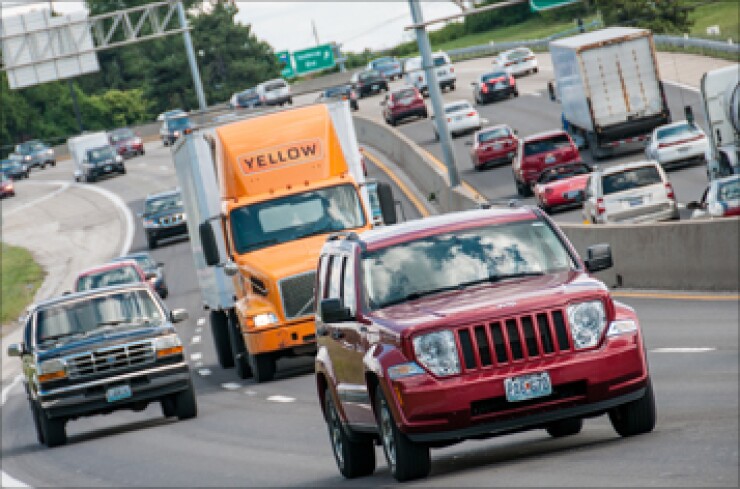
DALLAS — Missouri's proposed $2 billion upgrade of Interstate 70 could be financed by tolling the 200 miles of highway between Kansas City and St. Louis, according to analysis provided to Gov. Jay Nixon.
The study released Dec. 31 by the state Highway and Transportation Commission said a toll on cars of $20 to $30 to cross the state could provide the revenue needed to add a third lane in both directions and replace all the pavement on the interstate highway that was completed in 1965. Large trucks would pay up to $90 in tolls to transit the state.
State and federal gasoline and diesel taxes generate declining revenue streams that are insufficient to support Missouri's transportation system, the report said.
Nixon asked for the interstate toll study on Dec. 10 after Missouri voters in November rejected a constitutional amendment raising the state sales tax to provide $5 billion for transportation needs over 10 years.
Using toll revenues to expand I-70 and replace all the existing pavement would free up state transportation dollars for other projects, Nixon said.
"I look forward to reviewing the report in greater detail, particularly its analysis of how this approach, already in use in other states, could free up resources for road and bridge projects statewide, while minimizing the costs and inconvenience to drivers through technological advances," he said.
Nixon said tolls would ensure that the costs for improving and expanding I-70 are borne proportionately by the heavy trucks that cause the most wear and tear, and that out-of-state users also pay their fair share.
The state currently spends $50 million to $60 million a year to keep I-70 in its current condition, the analysis said, including bridge repairs, pothole patching, snow removal, and resurfacing.
"Reconstructing I-70 through some form of tolling could reduce some of these costs and result in a new and expanded highway but it will not free up enough money to solve the overall transportation needs for Missouri," the report said.
The interstate highway was designed and built between 1956 and 1965, and was intended to carry up to 18,000 vehicles a day. Current traffic loads average 28,000 vehicles a day on rural stretches and more than 98,000 vehicles daily on a segment near Kansas City.
The toll road could be built and operated by the state, a public-private partnership, or some combination of the two methods, the analysis said.
Options outlined in the report include an arrangement in which a public entity would issue the debt needed to fund the project as well as a long-term concession almost entirely financed by private partners.
Funding the project expected to cost at least $2.2 billion cannot be accomplished through conventional bond financing because the highway commission cannot issue more debt, the analysis said.
The commission, which oversees the state transportation department and serves as a bond issuer, has exhausted its borrowing capacity under a policy that limits debt service to no more than 20% of annual revenues.
Another entity, either the state or a separate tolling authority, would have to serve as a conduit issuer if new debt is needed to build the project, the report said.
Missouri, Virginia, and North Carolina are the only states authorized to participate in the Federal Highway Administration's pilot program to levy tolls on existing interstate highways, which is otherwise prohibited.
Virginia recently opened its second segment of tolled express lanes on interstate highways near Washington, D.C., but does not charge for existing lanes.
President Obama proposed a $302 billion, four-year transportation funding measure in 2014 that would allow states to collect tolls on existing interstates if the revenues are dedicated to highway maintenance.





